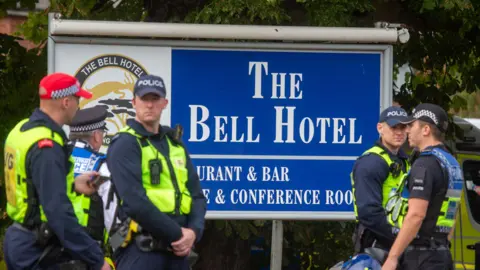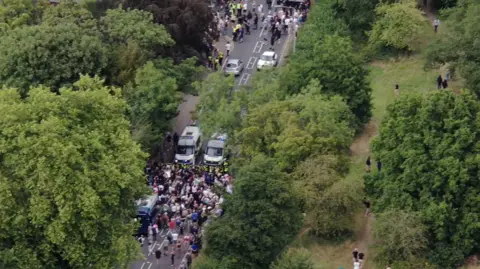We’re in the dark, says Epping asylum seeker
16 minutes agoLewis AdamsBBC News, Essex andEvan DavisBBC Radio 4 PM programme

 EPA/Shutterstock
EPA/ShutterstockAsylum seekers living at a hotel in Essex have been left “in the dark” about their future, according to a migrant living there.
People housed inside the Bell Hotel in Epping are due to be moved out by 12 September after a High Court judge found their presence breached planning laws.
Thousands of people have attended anti-immigration protests and counter-demonstrations outside the hotel since July.
Abdi, a Somalian man who said he was moved to the hotel in May, said: “We don’t know if one day a bus comes and says we’re going out from here.”
Lawyers for the Bell Hotel and the Home Office have been challenging the temporary injunction that meant 138 male asylum seekers would need to be evicted from the site.
Judges at the Court of Appeal are expected to give their ruling at 14:00 BST on Friday.
Abdi, not his real name, told BBC Radio 4’s PM programme closing the hotel would not solve the root cause of the problem.
“If this happens – if we are taken out of this place – then they will surely take us from every place we go to. It’s going to be the same,” he said.
He said “no-one says anything” to the hotel residents, adding: “We’re just in the dark.”

 PA Media
PA MediaFleeing a terrorist group, he said he spent three years travelling to the UK, arriving on a small boat he paid €1,000 (£864) to board.
He said he “came from Turkey to Greece to Austria to France” but several asylum applications in previous countries were rejected.
Abdi criticised some of his fellow asylum seekers living at the Bell Hotel, saying he had seen fights, drunkenness and drug use.
“Some people’s behaviour is not good, it makes the rest of us look very bad,” he said.
Hadush Kebatu, an Ethiopian who was living at the hotel, is on trial accused of several offences including sexually assaulting a 14-year-old girl in Epping. He denies the offences.
“Ever since the incident, we don’t go out,” he said.
“[We face] real intimidation, real hostility. The first time [the protests] happened I was like ‘Are they going to come in?’.”
Abdi said when he did leave the hotel to get food or go to a JobCentre, some people would insult him.
“In empty areas people come across you [and] they say ‘Scumbag, you this, you that’ – insulting words,” he explained.
“Before, there was nothing like that.”

 Essex Police
Essex PoliceDespite his situation, Abdi said he understood why many people were angry about asylum seekers.
If he felt safe living in Somalia and there was what he branded “mass migration” there, he admitted he would not accept it.
“I am on the side of the people who say it’s enough,” he said. “It’s logical, it’s reasonable, it makes sense.”
The government has pledged to no longer use hotels to house asylum seekers by the end of this Parliament.
Border Security Minister Dame Angela Eagle said the government would “continue working with local authorities and communities to address legitimate concerns”.
Follow Essex news on BBC Sounds, Facebook, Instagram and X.
More on this storyRelated internet links